In its simplest form, etiquette is nothing more than doing the right thing at the right time given a particular situation. Some of these rules have been written down, but most have not. So without a formal written code how do we know the correct conduct for a particular situation? Generally, determining the right thing to do — following the rules of etiquette — can usually be accomplished by leveraging common sense and always taking into consideration how you'd like to be treated if your role in the situation at hand was reversed.
When it comes to drifting rivers, adhering to these concepts and following the proper etiquette will help insure that everyone can have a pleasant experience while on the water. What follows is a quick list of the unwritten "rules of the road" as they apply to waders and boaters, or maybe better said, waders vs. boaters!
Putting In
Often, you won't be alone in wanting to launch your boat. Other fishermen with drift boats, canoes, kayaks or pontoons will also be at the ramp, with the same goal as you. To keep everything running smoothly, it is important that everyone respect their place in line and their time on the ramp. Have your boat rigged and loaded before you back down on the ramp. If you're not ready and there are others waiting, it is okay to let them ahead of you.
Once you have your boat in the water, move it to the side so others can launch. If there's current, the downstream side of the ramp is a better choice so as not to interfere with others when you get underway. When in doubt, ask someone.
Wading Anglers
Now you're fishing, and low and behold, there's a guy wading. Now what? The best thing is to go behind him, causing minimum disturbance as you do. Don't dip your oars unless you need to do so to maintain control of your boat. If the water is too shallow to float, quietly get out of the boat and — as quietly as possible — walk your boat behind him. Do not fish the water as you go by. Doing so is just plain rude, and you'll be down river soon enough to start fishing again. The wade fisherman always has the right of way.
Sometimes you have a situation where there isn't enough room to go behind the other angler. There are several options here. First, if the section of river is wide enough, you can hug the opposite bank as long as you are well out of the water he's fishing. Another option is to pass close to him on the center river side, but only after letting him know of your plan. If he objects, get out and drag the boat behind him. Wade fishermen are allowed to step back toward the bank to let a boat through, and most will in tight situations.
There's nothing wrong with friendly communication.
Other Boats
Okay, you got through that situation. Now you come upon another vessel ahead of you. If the other boat is anchored and they obviously are fishing toward the right, pass far on the left. The reverse is also true. If you can't tell, or aren't sure, just ask what side you can pass on. Always give as wide a berth as possible.
If the boat is underway and drift fishing, pass on the opposite side that they're fishing, again giving as wide a berth as possible. The wide berth will keep you out of their back cast and you from getting hooked. Keep in mind that the vessel being overtaken always has the right of way. This is the law and has nothing to do with etiquette. Once you pass the other boat you should never cut in front of him and start fishing. Go down river a long way, even to the next pool or riffle before you start fishing. If you absolutely must fish that water, hold your boat back and fish behind them.
Never jump in on anyone else's fish unless invited. Don't even ask. Just go find some different fish. Don't anchor in casting range of anyone else. Since you don't know how far anyone can cast, assume it to be a fly line length. When you anchor, do it quietly and when it's time to move on, leave quietly too. Never put down the fish you were fishing to. Let the next guy have a crack at them.
Be mindful of where you anchor. Sometimes you just need to stop, maybe for a rest or a bite to eat. When you do, you should notice where you are. Be careful not to block a narrow channel and make it difficult for other to get by.

Taking Out
Well, all in all, it's been a great day on the river. You landed some monster browns, netted some rainbows and even had a few "Kodak Moments" and nobody fell in. The sun's getting low and you really don't know the river that well. What should you do? Head for port! Unless you have enough experience and have confidence in the dark, don't stay out in the dark. If you do, make sure you have the required safety equipment with you, and yes, pontoon boats have the same requirements as other vessels. When you get to the boat ramp follow the same courtesies you did when you launched.
At night on the ramp try to avoid shining vehicle headlights or other bright lights upriver. This only serves to blind other operators and make navigation difficult. If you are shining a light upriver to help someone find the takeout, see the previous paragraph. You may have to wait your turn to take out and when your turn comes you should be ready. Once your boat is on your trailer, pull it up out of the way and then secure your tie down straps, put your tackle away, and take off your waders and anything else you need to get done. If you are waiting for a shuttle, let the next guy ahead of you.
All you need to do is remember to treat others the way you want to be treated. Unfortunately, you are bound to run across idiots, whether they be on foot or in a boat, and when you do, there's no sense going crazy because you're not going to ruin their day, only yours.

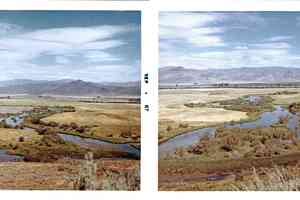


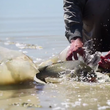


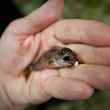
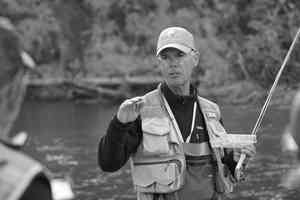




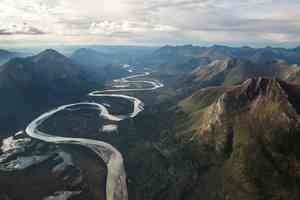

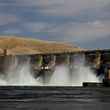


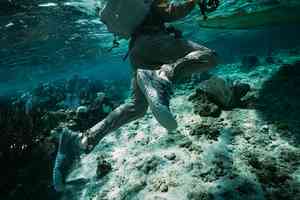
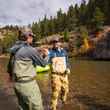

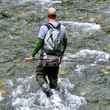
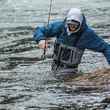
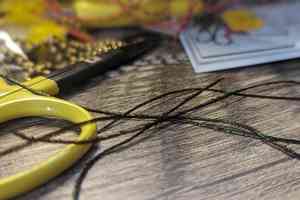
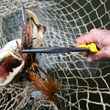
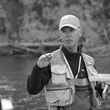

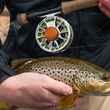
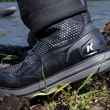

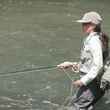
Comments
JT replied on Permalink
Wait.
Aren't waders second class citizens?
I say they yield to the real fishermen. You know, the ones in those boats.
Anonymous replied on Permalink
They paid $400 for the trip.
They OBVIOUSLY have the right of way.
Tobiyashimoto replied on Permalink
This is why you get a jet boat. Then you don't have to worry about any rules or etiquette. You just blast by everyone full speed.
Matt replied on Permalink
On a serious note what do you think the pro guides opinions would be if someone put in a jet at the Long Eddy ramp and ran upriver to Lordvillle and then fished their way back to Long Eddy?
Chris Kule replied on Permalink
An alternative word: "consideration". For others as well as oneself. There are no rules, but there are reasonable expectations. Any of us might, at any point, need that other guy. Thanks for the good thoughts.
K-Dog replied on Permalink
I've waded the author's home water for 20+ years and never had an issue with a driftboat / guide. In the past 7-8 years, I've taken to floating the river on my own. When floating, I use try to 'do unto others' as I'd want done to me. I'm as thoughtful as I can possibly be. I float or walk my boat behind waders so I don't disturb their fish, they continue to cast hitting me and my boat. I'm trying to be nice and don't know what their problem is. Are they angry that they aren't floating? Are they bent that 20 boats have come by in an hour? Who knows? One thing I do know.....next time some guy looks at me and then fires a backcast at my head....get ready! I'll be grabbing your line and rowing as fast as I can. You will be spooled in seconds and if there's a GOD, you rod will snap trying to stop me. I'm doing everything I can not to disturb your or your fish but you take offense. It's a resource for all to share and I could probably row 30' in front of a majority of waders since many of them struggle to throw a 9' leader and 20' of fly line.
Another thought is that on a river with a fair amount of boat traffic, the fish become numb to a boat drifting by. I've caught them 4' off the front / side of the boat or have floated through and fish start rising 15' behind the boat. As long as you aren't making a ton of noise, they usually keep feeding. The exception is the elders in the pool. They stop feeding when you drop anchor and start feeding again once they hear you pick it off the bottom.
Chris Kule replied on Permalink
Look. The fishermen are more important than the fishing. If the wader gives you a look just say you are passing him and will try not to disturb his fishing. If he backcasts into you, throw his cast into the river and move on. If, somehow, he injures someone in your boat, beach and call the cops. In any event forget about being belligerent. If it's too hard to offer sportsmanship go home.
Matt replied on Permalink
Great comment! I've had a Hyde low profile for sixteen years and often I've had guys casting as I go behind them even after I told them I was passing by so as not to screw up their fishing. I've had people tell me not to go behind them and then when I hugged the opposite bank they sometimes still get cranky, flip me the bird, or have some nice comments for me. I'll never forget the time I was floating into the top of lower Game Lands and there were guys nymphing river left on the other side of that island. The water on river right was quite skinny and a guy was standing right in the middle of that narrow water. I asked him which side he would prefer I go down and he yelled back to me "Neither I'm fishing both sides". Sure enough he would make a cast to the one side, fish it through, then pick up and cast to the other side. I just blew by him when he was throwing to river left and put on my deaf ears so I wouldn't hear his rants.
WINGNUT replied on Permalink
I too fish the authors home water. I never had a problem with a drift boat while wading. Its a crowded river system. Most guides and private boat owners are very respectful. After transitioning to a drift boat I can say I try to accommodate a wading angler exactly as the author has outlined. A few times I've had a wading angler make a comment or rude gesture. At first I would get annoyed but then once during my rookie year of floating. I erroneously placed a fly rod without the fly secured and was apparently trolling a #16 sulfur twenty feet behind the boat. Well as I passed a wading angler in a fast section of river the fly stuck him good. Reel started screaming, he yelled out but then began laughing and it took me a good ten seconds to realize what the hell was going on. Even before my repeated apologies the gentleman was calm. He just stated "no problem, sorry I had to break off your fly". Since then I use his demeanor as a reminder not to overreact during the few negative encounters I've had with wading fishermen.
Bob replied on Permalink
Guides are the worst, 2 sets of rules one for the pros and the rest for us common folks. Doesnt matter if I'm wading or in my clacka, all the problems are with guides that think they own the river
AKH replied on Permalink
Just an added tip... know the water laws of the river you're fishing, whether you're wading or floating. I live and guide on a river that is mostly private property (the river bed is owned by the landowners) so if someone is anchored or wading in a place where they aren't allowed to do so (especially when they are fishing right in front of a "no anchoring/no wading" sign... yes this happens more often than you'd think) I find it difficult to extend the same ettiquette to them that I would to any other fisherman. If someone genuinely doesn't know, that's one thing, but if they are blatantly ignoring the rules of the landowners, right of way sort of goes out the window. It's easy to be a rebel when you plan on leaving town in a couple days, but that is how those no trespassing signs go up and are enforced in the first place. If you are visiting, just know the laws and respect them. You don't have to live with them you just have to deal with em for a day or two. Local guides and folks who know the river well work around the laws, rowing around runs that you can't anchor in, only stopping on public land. So if you ignore the laws it sort of puts a hitch in everyone's giddyup.
Old Timer replied on Permalink
I agree that drift boat ettiquete is definitely important. But nobody really cares any more. There are just to many attitudes drifting in those boats. Far-away people who dream of catching big fish, professional guides who have to catch big fish and locals who obviously should have the opportunity to catch big fish.
After many years of watching this sport become more popular maybe the problem is that to many people want to use limited resources. What once used to be the rare occasional encounter with another fly fishing person is now a minute by minute experience. Fly fishing people do not share the common bond that brought people together years ago. I hate to even think of having to parcel out fishing beats like the British, but sadly it looks like it is coming to that, if the fish can survive the continuing climate change.
I have had my share of encounters by drifters when wading and vice versa. I can hit most any target up to 90 feet with ease ( using hooks 32 to 2/0 sizes) and have hit a number of difters to make my point when wading or using a water craft. If you haven't been hooked by irritated old timer, you are in for an experience.
Years of fishing have taught me to be keep my cool and try getting to know the person next to you. Bait or Fly fisher, you never know what you will learn, and I find most people just want to have a good experience, big fish or not. But being rude will get you this old timer's rathe. And in places like the mountain west or Alaska, you should probably keep it to yourself, after all you might look like a bear and then you never know what will happen!
Midwest Guy replied on Permalink
Man, this is a sad commentary on yet another sport that has been loved to death. I don't even fish those waters but I can just imagine the circus on Western rivers. Between the ethical fish handling preachers and the vanlife / trout bum crew, I wonder how long it will be before it is no longer fun for anyone to flyfish. For all the lifestyle advocates that have sprung up since the pandemic, please go back to doing whatever you were doing before the pandemic and leave the water to the people who actually do know what they are doing.
Old Timer replied on Permalink
Then I guess you really didn't have anything meaningful to say!!!
Pages